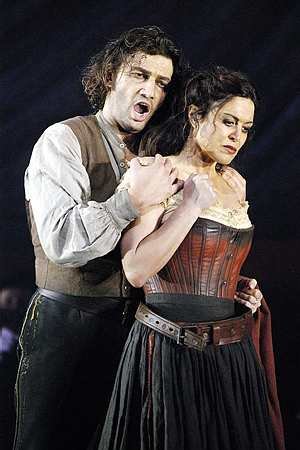|
|
|
|
|
|
|
|
| timeout.com |
|
Bizét: Carmen, Royal Opera House, London, 8 December 2006
|
| Fri Dec 22 Royal Opera House |
|
 Miracles do happen. The ROH's new production of Bizet's
wonderful – but hideously hard to bring off – opera about the
cigarette-girl who can damage your health fields an eternal triangle who
are beautiful and sexy, lovely movers and compelling actors. Francesca
Zambello's direction, as we know, is good on crowds, with set pieces that
occasionally veer into out-to-the-front Broadway routines, and this
production piles on the effects, including poultry, mules and, for
Escamillo's impressive entrance, a superb black horse (though a slightly
breathless baritone lagged behind the conductor's beat and didn't sound
too secure in pitch in the saddle). But there are also moments of intimate
intensity, as in Act 2 when gypsy girl and besotted soldier crouch on the
ground like watchful animals, flawed wild creatures, doomed by a destiny
as unyielding as the sun-baked walls of Tanya McCallin's set. Not for the
first time the thought occurs that the work should be entitled 'José'.
It's not the diva's fault: the tenor's role is a brilliant chronicle of an
emotional journey. José actually develops and changes, Carmen stays the
same. She has three show-stopping numbers, he has the Flower Song, which
Jonas Kaufmann turns into a passionate psychological drama, delivered with
such intensity (and burnished tone) that it scored the first night's
biggest ovation. Anna Caterina Antonacci's intelligent Carmen lightens her
soprano (the Standard, as ever on its own planet, referred to her 'rich
mezzo') to convey the music's Gallic nimbleness but at the moment lacks
vocal colour and character. Other good points: spoken dialogue is kept to
a minimum, and the onstage French induces no winces. No real weaknesses,
though the Micaela was in fluttery voice and fidgety histrionic mood.
Apparent updating to the time of the opera's composition (1870s) adds
little except some smart clobber for posh supernumeraries. Pappano evokes
sleek orchestral sound that highlights Bizet's refined scoring – is that
the trouble with 'Carmen'? We want sweat and Italianate bawling or Spanish
tang and resin, while Bizet has composed an archetypal French score,
elegant, stylish, witty, restrained (honestly; listen to the
instrumentation) to a story of lust, jealousy and murder. Given the work's
dichotomy, this peformance has much to enjoy as a sleek holiday treat. But
withers remain unwrung, geese unpimpled. Miracles do happen. The ROH's new production of Bizet's
wonderful – but hideously hard to bring off – opera about the
cigarette-girl who can damage your health fields an eternal triangle who
are beautiful and sexy, lovely movers and compelling actors. Francesca
Zambello's direction, as we know, is good on crowds, with set pieces that
occasionally veer into out-to-the-front Broadway routines, and this
production piles on the effects, including poultry, mules and, for
Escamillo's impressive entrance, a superb black horse (though a slightly
breathless baritone lagged behind the conductor's beat and didn't sound
too secure in pitch in the saddle). But there are also moments of intimate
intensity, as in Act 2 when gypsy girl and besotted soldier crouch on the
ground like watchful animals, flawed wild creatures, doomed by a destiny
as unyielding as the sun-baked walls of Tanya McCallin's set. Not for the
first time the thought occurs that the work should be entitled 'José'.
It's not the diva's fault: the tenor's role is a brilliant chronicle of an
emotional journey. José actually develops and changes, Carmen stays the
same. She has three show-stopping numbers, he has the Flower Song, which
Jonas Kaufmann turns into a passionate psychological drama, delivered with
such intensity (and burnished tone) that it scored the first night's
biggest ovation. Anna Caterina Antonacci's intelligent Carmen lightens her
soprano (the Standard, as ever on its own planet, referred to her 'rich
mezzo') to convey the music's Gallic nimbleness but at the moment lacks
vocal colour and character. Other good points: spoken dialogue is kept to
a minimum, and the onstage French induces no winces. No real weaknesses,
though the Micaela was in fluttery voice and fidgety histrionic mood.
Apparent updating to the time of the opera's composition (1870s) adds
little except some smart clobber for posh supernumeraries. Pappano evokes
sleek orchestral sound that highlights Bizet's refined scoring – is that
the trouble with 'Carmen'? We want sweat and Italianate bawling or Spanish
tang and resin, while Bizet has composed an archetypal French score,
elegant, stylish, witty, restrained (honestly; listen to the
instrumentation) to a story of lust, jealousy and murder. Given the work's
dichotomy, this peformance has much to enjoy as a sleek holiday treat. But
withers remain unwrung, geese unpimpled.
|
|
|
|
|
|
|
|
|
|
|
|
|
|
|
|
|
|
|